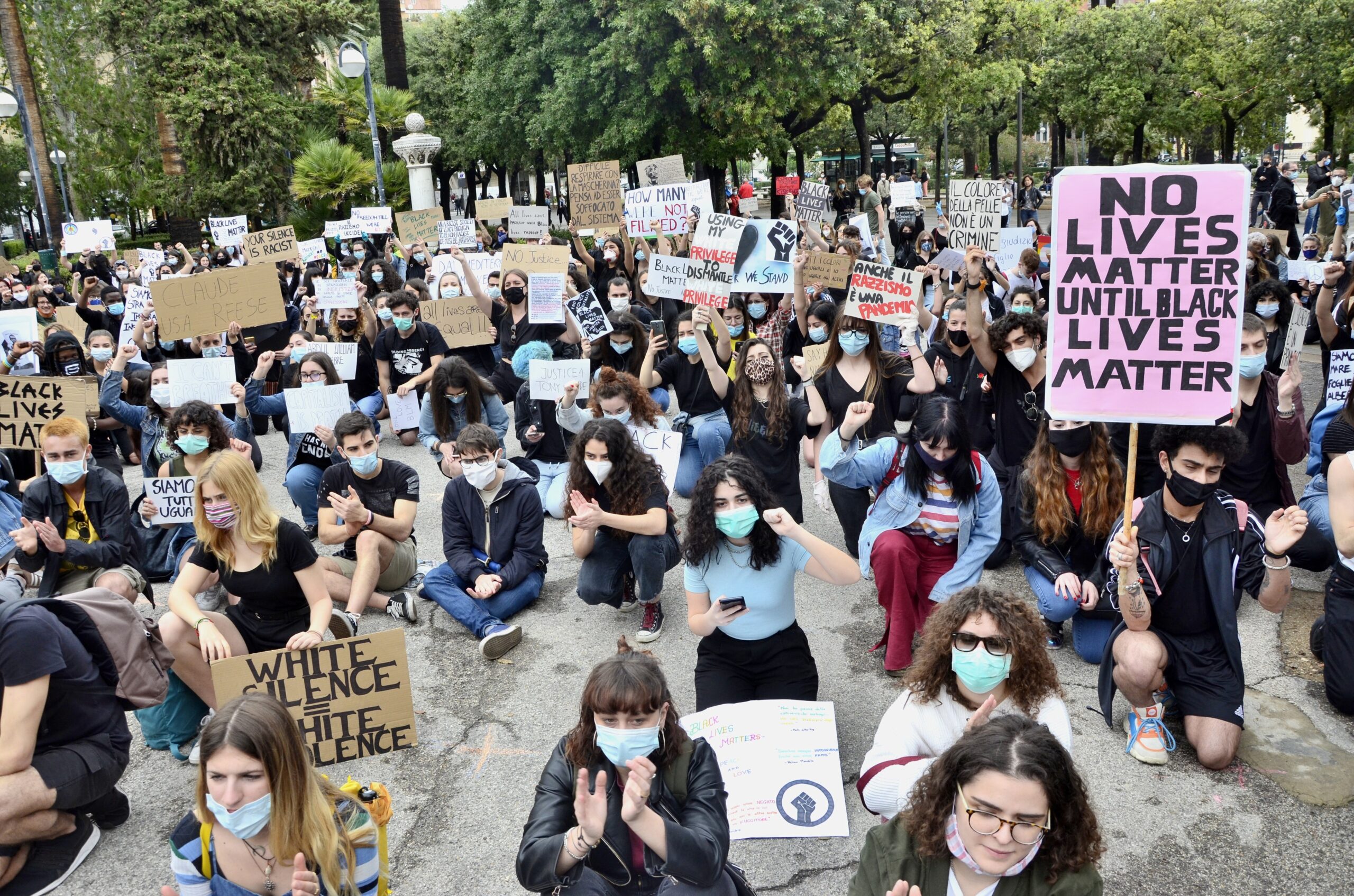Following the brutal killing of George Floyd by the Minneapolis police, US citizens have been protesting across the nation. They demand an end to racial inequalities and disproportionate police brutality – both epitomised by the events surrounding Mr. Floyd’s death.
The viral video that sparked the first protests features the 46-year-old African American begging for air while a white officer’s knee presses on his neck (warning: graphic content).
But as public rage channelled itself into demonstrations, police forces in riot gear have sometimes confronted protesters with excessive force – rubber bullets, tear gas, pepper spray, batons. Consequently, more videos bearing witness to police misconduct have emerged, as to implicitly prove that the protesters’ accusations are founded on truth.
Within a week from Mr. Floyd’s death, protests had gone global. Europeans, like others, saw the videos and reacted, joining the global protest while adapting it to their local flavour of racism. Their placards displayed the names of fellow residents who were killed, either in police custody or because of plain racism.
European police lethality is surely lower than the US’s (and here’s why), but racially motivated crimes have been on the rise in some European countries, and political figures across the bloc bank on xenophobic, anti-immigration sentiments.
Few Europeans would say that racism doesn’t exist in Europe, but most of them would agree that it isn’t as bad as in the US – which holds true to the casual observer. However, the US is historically and socially better at highlighting racial issues. The more diverse population simply makes racial disparity harder to ignore.
Then again, Europeans might be more familiar with American civil right history than with European colonialism and its consequences. Hollywood films, US TV shows, popular culture – the US’ soft power had us all acquainted with its social reality.
Nonetheless, Europe has a rich history of marginalisation – ethnic, racial, religious. European colonialism alone was responsible for millions of deaths. It also spawned the Africans Americans by shipping Africans across the Atlantic, without regard for their wellbeing, let alone their civil rights.
So why are we more sensible to the plight of American minorities than our own European ones? Two reasons: one cultural, one systemic.
Black British journalist Gary Younge noted that the cultural reach of Black America is by far the most powerful among global black communities. “[A]cross Europe, we know the name […] of George Floyd. Whereas Jerry Masslo, who escaped apartheid South Africa only to be murdered by racists near Naples in 1989, [is barely known].”
And again: “[The] selective amnesia about [some Europeans’] imperial legacy leads ineluctably to a false sense of superiority around racism among many white Europeans toward the US. Worse is the toxic nostalgia that to this day taints their misunderstanding of that history.”
The non-white population in Europe is significant, too. Aside from descendants of immigrants, it comprises the rising number of economic migrants and refugees trying to establish themselves as European citizens – roughly 4% of the whole population.
The protests bear testimony to the fact that ethnic minorities in the EU are still victims of racism. But many Europeans, including those who don’t necessarily lean towards the hard right, don’t deem the problem to be serious or endemic. This is a cultural defect.
Regardless, European social media is now awash with #blacklivesmatter posts, some supportive, some adverse. European societies, on the streets and online, are responding to the US-born movement.
It is not my intention to dabble in whataboutism. However, if the core matters are the recognition of basic human rights and the end of discrimination, I will point out that in recent history nothing of the same magnitude has occurred for European-branded racial injustices. It didn’t happen for European ethnic minorities, nor did it happen for migrants and refugees.
This problem lies in the recognition of the problem. European member states simply fare poorly in maintaining hate crime databases.
The EU Agency for Fundamental Rights highlighted that very few victims report hate-motivated violence, and even when they do, it’s not always flagged as hate crime, as the police might be incapable of recognising their own or others’ prejudice, or they may simply lack the tools. Thus, the hate crimes “remain unidentified or unrecorded – and thus un-investigated, unprosecuted, uncounted and, ultimately, invisible.”
But systemic racism is not limited to hate crimes. Here’s Esther King for Politico: “Most European governments don’t systematically collect data on how a person’s race affects their chances of employment or on the housing market, their treatment in health care or their interactions with police.”
In plainer terms, not only do we as Europeans lack the data to build effective anti-racism policies upon – we don’t think we need to gather that data.
The US, as divided as it is, proved culturally capable of acknowledging the racial disparity and giving it mediatic oxygen. It happened despite the lack of American leadership or universal consensus on racism: it happened because of a tangibly violent video, and because the pot had boiled over.
This hasn’t happened in Europe because of its structural incapacity. The European public discourse on racism, dampened by its short-sighted culture and missing data, doesn’t seem capable of flourishing from the inside.
But it had to happen. So, Europeans imported it.
Here in the Old Continent, the Black Lives Matter movement is resonating, and the public discourse is finally starting to zero in on the issues. But if we’re to make the discussion meaningful, it must be an informed one.
Data collection is key to fight racial inequalities and hate crime. To get there, we as Europeans must first revisit our culture, talk about our history and readjust our level of consideration of racial issues.








